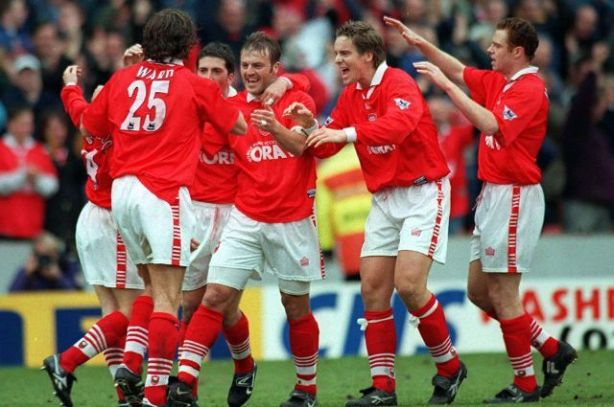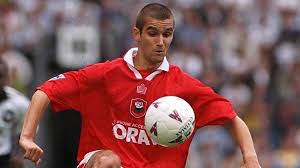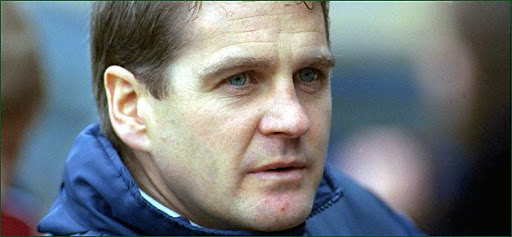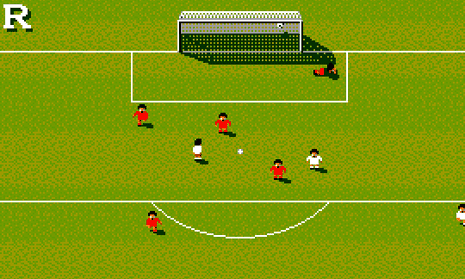
The window between Euro ’96 and France ’98 was something of a coming out party for the Premier League. Previously considered little more than a retirement home for the big names, it was now able to attract international stars at their peak – your Zolas, your Overmars, your Ravanellis – and had produced some genuine glitz of its own in the form of young stars like David Beckham and Michael Owen.
It was into this increasingly glossy, glittery melange that a Yorkshire cannonball was fired in the summer of 1997. Prior to Barnsley’s entirely unexpected promotion, the Premier League had experienced precious few genuine underdog stories since its rebranding. There had only really been Swindon’s disastrous season in 1993-94; the majority of promoted sides had either been relegated clubs yo-yoing back up or big spenders like Blackburn and Newcastle. The Tykes were an appealing throwback.
The story of their lone top flight campaign is part kitchen sink drama, part Last of the Summer Wine farce, as they sporadically bloodied the nose of the big boys amid some right hammerings and self-inflicted slapstick. Their time at the top table always seemed likely to be brief, but they certainly lived it to the fullest…

Are you watching, Mark McGhee?
The kind of TV deal invariably referred to as ‘bumper’ had given many second-tier clubs licence to dream in the summer of 1996, but Barnsley weren’t really one of them. Danny Wilson’s side had finished 12th the previous season, and an exodus of established players followed, led by 20-goal Andy Payton. They were replaced by assorted freebies and bargain bin acquisitions like Trinidad and Tobago forward Clint Marcelle, signed for just £75,000 following a tip-off from Sir Bobby Robson, and strikers Paul Wilkinson and John Hendrie, ousted from Teesside by Middlesbrough’s own lust for White Feather star wattage. The signings galvanised a core of local youngsters such as Adie Moses, Nicky Eaden and Andy Liddell, plus the formidable Yorkshire fire and shoot-on-sight policy of captain Neil Redfearn.
Winning their first five games, The Tykes set about playing open, enterprising stuff, and were soon established in the automatic promotion places. They were still there at Christmas, too, and the goals poured in – the ready-made partnership of Wilkinson and Hendrie would plunder 30 goals between them before the season was out, while Redfearn managed 17 (most of them screamers) on his own. It took a long time for everyone to realise, but Barnsley were the real deal.
This came much to the chagrin of Mark McGhee and Wolverhampton Wanderers. The Glaswegian, a disciple of Sir Alex Ferguson, appeared personally affronted that unassuming Barnsley dared stand in the way of what had appeared to be Wanderers’ long-awaited coronation after years of big-spending failure. Having a bash at some mind games as squeaky bum time loomed, he suggested Barnsley would be an embarrassment to the Premier League, and repeatedly claimed it was only a matter of time before they’d bottle it. “Nerves?” he asked, aghast, when it was put to him that it the season had reached a particularly nailbiting point, “I’m cruising. How are Danny Wilson’s?”
McGhee’s proto-Phil Brown act backfired spectacularly, serving only to provide the Tykes with the extra juice they needed to get over the line. Victory in a nervy last home game against Bradford was sealed courtesy of a bit of magic from Marcelle. With supporters openly weeping in the stands, Barnsley, for the first time in their 110-year history, were a top flight club.

Premier Preparations
Regularly averaging four-figure crowds as recently as the previous December, Barnsley now had queues for season tickets snaking along Grove Street, while renovation work commenced to bring Oakwell up to snuff. “It’s as if something has dropped on us from Mars,” exhaled club secretary Michael Spinks, as they disbelievingly succumbed to the trappings. The team, for their part, couldn’t believe their luck when they learned that all Premier League players were issued with a McDonalds Gold Card (Neil Redfearn’s eyes still light up at the memory 20 years later in excellent documentary Daydream Believers), while celebrity fan Ian McMillan was appointed club poet.
Again forced to operate on a tight budget, Wilson sought to find more Marcelle-like bargains in the European market. Bayer Leverkusen received £250,000 for giant goalkeeper Lars Leese. South African midfielder Eric Tinkler signed from Cagliari. Creating the most buzz was striker and £1.5m record signing Georgi Hristov, a Macedonia international.
The exoticism of the new arrivals saw them treated like megastars in Barnsley, yet some of them would have struggled to get arrested in their own countries, and were disconcerted by the adulation. Hristov was a 21-year-old kid who didn’t speak a word of English. Leese had been signed after his agent assured Wilson he was Leverkusen’s second choice ‘keeper. In fact he was third choice and had never played a professional game. In Ronald Reng’s outstanding book on Leese, The Keeper of Dreams, the goalkeeper struggles to contain his bewilderment at opening a branch of Thomas Cook in the town and being greeted by a queue of over 100, and at discovering McMillan had penned a poem in his honour;
‘Lars Leese, listen please…we think you’re very good’…

The shoulder of giants
For all the giddiness at the shiny new toys, Wilson was keen to give his promotion heroes the first crack at Premier League football – Tinkler was the only new arrival to make the starting XI when a sun-dappled Oakwell hosted West Ham United for The Tykes’ first ever Premier League game. The roar when Redfearn – it was always going to be Redfearn – opened the scoring could be heard from Birdsedge to Crigglestone, but the afternoon would end in a 2-1 win for The Hammers. It would prove an ominous portent of things to come.
Though their first ever top flight win would come three days later against another newly promoted side, Crystal Palace (who’d have an interesting season of their own), and goals from Tinkler and Hristov saw off Bolton, Barnsley lost eight of their first 10 games. They’d attempted to play the same kind of open, attacking game that had earned them promotion, but savvier opponents exposed them again and again. Chairman John Dennis had some fun in promising Ken Bates a fancy dinner and then directing his limo driver to a local chippy, but it seemed less funny after The Blues administered a 6-0 drubbing. Arsenal scored five. Manchester United scored seven. “There was absolutely nothing between the sides apart from the seven goals,” signed Wilson, gallows humour deployed before the end of October.
Another issue was that the arrival of the continental players had ruffled a few feathers in the dressing room. Not only were the new signings paid considerably more than the promotion winners, but they had in many cases usurped them in the team – Leese talks of an ‘invisible dividing line’ running through the dressing room. Some found it difficult to settle in the town, none more so than Hristov. Desperately homesick, he gave an interview to a Macedonian paper in which he reportedly claimed that the women of Barnsley were ‘ugly and drank too much beer’. Though he insisted he had been misquoted, the story made the front page of The Sun, and in an attempt to soothe outraged supporters, Hristov did penance by judging a local beauty contest. Nineteen. Ninety. Seven.
The failure of the European gambles put Dennis off a combined £250,000 deal lined up for two little-known Swedish players later in the season. Johan Mjallby and Freddie Ljungberg might just have made a difference…
There was the hint of the whole dream beginning to sour. “People say we should treat being in the Premier League like a party,” a frustrated Dennis complained. “We’re getting regularly spanked, and we’ve just had one of our [youth] players test positive for drugs. Oh yes, we’re having a spiffing party.”

Red or Dead
Finally, Barnsley got tough. Aware of the need to inject physicality and top-level experience into the team, strikers Ashley Ward and Jan Aage-Fjortoft were signed. After a 4-1 battering by Southampton, Wilson delivered an almighty bollocking, and his charges seemed to get the message. A savvier, flintier Barnsley emerged just in time for a trip to Anfield.
Wilson made two bold decisions before the game – first, he allowed his uptight players to go to the pub the night before the game to encourage them to relax. Then, he recalled Leese to his starting XI. The big German was magnificent and Barnsley’s rearguard action tremendous, as Ward’s goal allowed them to sneak a 1-0 win. It was arguably, at that point, the biggest shock in Premier League history. The Tykes left the field to the stunned applause of the Kop.
It was the catalyst their season needed. They were able to transfer some of that same grit to their home form, not losing at Oakwell between November and March. An FA Cup run added further momentum, and they famously knocked out Manchester United after a replay, Peter Schmeichel gifting Hendrie goals in both games and fringe defender Scott Jones grabbing a brace. By March, they’d nearly clawed their away out of the relegation zone, threatening to dump Tottenham, Christian Gross and his ‘dream ticket‘ there instead.

The End
If the Liverpool fixture kick-started Barnsley’s comeback, however, the return fixture would pretty much kill it. A chaotic game at Oakwell saw referee Gary Willard send off three Tykes players in a display that so incensed the home support that 17 of them would be arrested by the end of the afternoon. One fan made a beeline for Willard and had to be rugby tackled by Fjortoft. So rattled was the referee that he retreated to the dressing room without telling the teams, leaving them guessing for a full five minutes as to whether the match had been abandoned. Barnsley’s remaining players made a fight of it but eventually lost 3-2.
The defeat all but sunk them. Not only did they have the suspensions to deal with, but their belief was sapped. Just as returning hero Jurgen Klinsmann was pulling Spurs out of the mire, punch-drunk Barnsley slipped from defeat to defeat on the home stretch, losing six of their last eight. Relegation was confirmed in their penultimate game at Filbert Street in a 2-1 reverse to Leicester. In the dressing room after the game, all the players could hear was the away fans serenading their team.
Ultimately, what cost Barnsley was that early naivety. Had they got in some players with top flight experience sooner, had they got nastier earlier, had they defended as they did at Anfield more often – rather than concede 82 goals – they may very well have survived. “No one can score from Row Z. It took us a long time to learn that,” Wilson would lament.

No Way Back
Nevertheless, the defiant message from Oakwell was “we’ll be back”, and the foundations certainly seemed to be in place for a swift return…until they weren’t. Wilson left that summer for another crack at the Premier League with boyhood club Sheffield Wednesday, which went down as well as you might imagine. Redfearn, the undisputed star of the side, followed suit, to enjoy pretty much the same experience again with the top flight’s newest underdogs, Charlton Athletic.
Dressing room joker Hendrie, to almost universal astonishment, was appointed manager; his abrupt switch from arch prankster to dour authoritarian predictably alienated many of his former peers pretty quickly, while also robbing the team of his twinkly, canny gifts on the pitch. Despite a healthy transfer budget by second-tier standards of the time, The Tykes could only finish 13th.
They would never return to the Premier League. Yet their sole season embraced a special kind of chaos that English football just doesn’t seem to produce anymore. In-house poets, Macedonian media scandals, queues outside travel agents to meet a player who’d never kicked a ball professionally…indeed, the two Liverpool games alone contained enough drama to warrant their own Netflix series.
In a short space of time, they created enough memories to ensure that there is a corner of the Premier League that is forever Barnsley.
